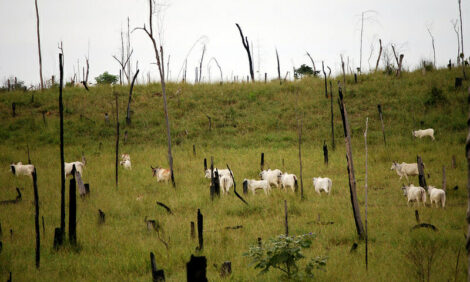



Novel H1N1 Found in Few HK Pigs; no Reassortment
HONG KONG - The Centre for Food Safety (CFS) says that seven pigs tested positive for human pandemic H1N1 flu betweem November 2010 and January 2011 on routine surveillance but reports that no significant genetic re-assortment of viruses was found.Yesterday (16 February), CFS announced the results of the regular influenza virus surveillance programme on pigs conducted by the University of Hong Kong (HKU) in the past three months (from November 2010 to January 2011) at the Sheung Shui Slaughterhouse. Seven samples tested positive for human swine influenza (pandemic H1N1) virus, but no significant genetic re-assortment of viruses was found.
A spokesman for the CFS said that given the wide transmission of the pandemic H1N1 virus in humans, detection of the virus in pigs was not a surprise. It was expected that positive findings might appear from time to time in HKU's surveillance programme.
The spokesman said: "The CFS will continue to monitor reports of HKU's regular influenza virus surveillance programme on pigs and make announcements on a regular basis. Results will be announced immediately if there are significant public health impacts such as genetic re-assortment of viruses."
Under this surveillance programme, which aims to monitor the circulation of influenza virus in pigs, the CFS has been helping HKU researchers by collecting blood, tracheal and nasal swabs from pigs at the Sheung Shui Slaughterhouse twice a month.
According to the World Health Organization, the Food and Agriculture Organization of the United Nations and the World Organisation for Animal Health, human swine influenza will not be contracted by consuming pork and pork products that are handled properly and thoroughly cooked. Members of the public are advised that it is safe to consume pork and pork products that are cooked to an internal temperature of 70°C or above.
"All imported live pigs from the Mainland should come from registered farms and be accompanied by animal health certificates issued by the Mainland authorities. The Food and Environmental Hygiene Department (FEHD) inspects the certificates and health of the imported pigs at the boundary control points. Pigs also have to go through ante-mortem and post-mortem inspection in the slaughterhouses. Only pigs that pass the inspection can be supplied to the market and sold for consumption," the spokesman said.
Apart from the enhanced inspection of imported live pigs, the FEHD has also reminded slaughterhouse staff and people who might be in contact with live pigs to pay attention to personal hygiene and to wear masks and appropriate protective gear at work, he added.
"The CFS has been liaising closely with the Mainland authorities to monitor any abnormal situation concerning Mainland farms supplying live pigs to Hong Kong, and farm inspection will be stepped up when necessary."
Further Reading
| - | Find out more information on influenza in pigs by clicking here. |







